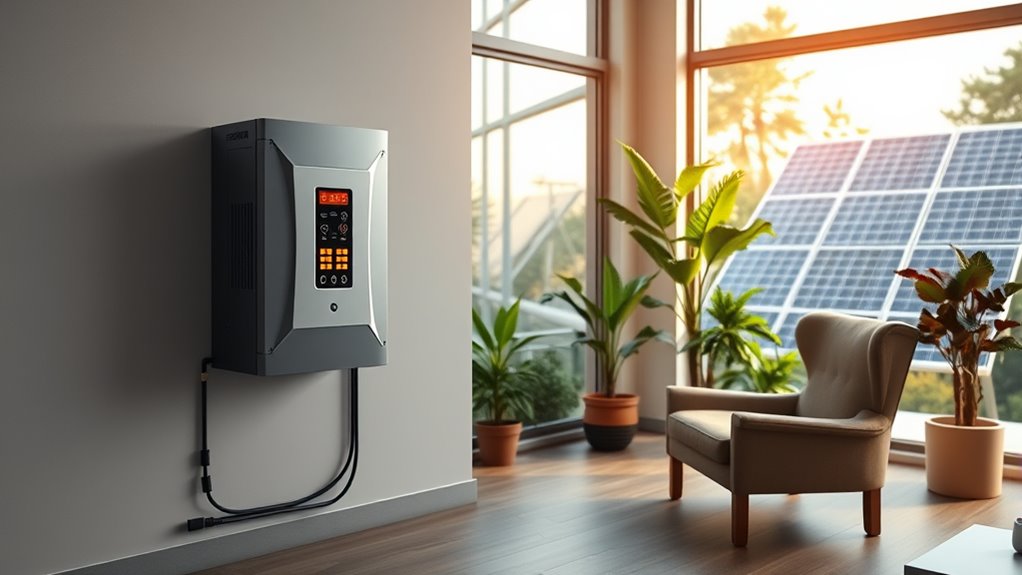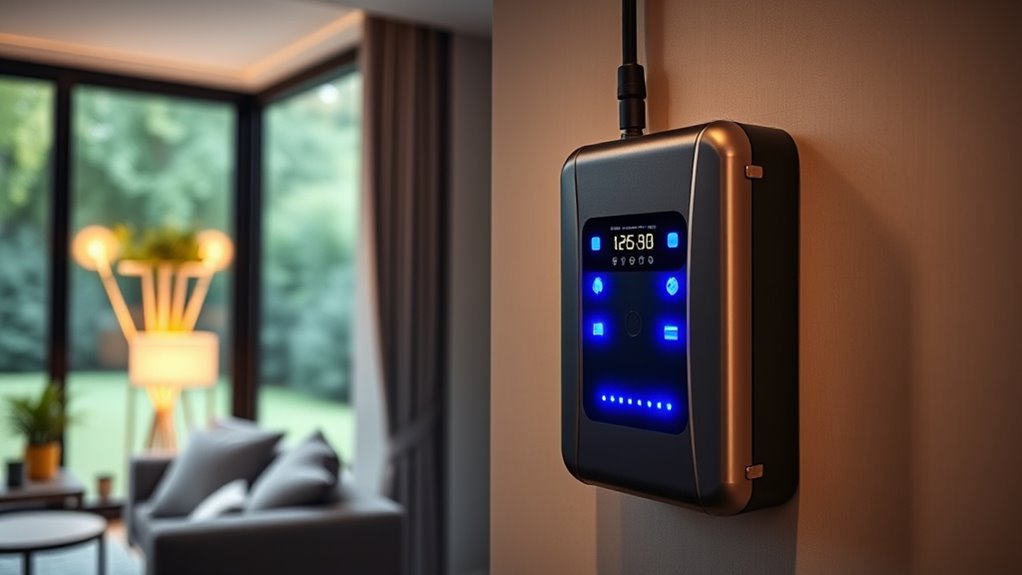Home battery backup systems can be a smart investment if you want reliable power during outages, maximize your solar energy, and lower your reliance on the grid. They offer benefits like cost savings, energy security, and protecting against severe weather. While initial costs vary, incentives and decreasing prices make them more affordable over time. To determine if they fit your needs, consider your energy goals and budget; exploring further will help you make an informed choice.
Key Takeaways
- They provide reliable backup power, ensuring essential appliances stay operational during outages.
- Investing in solar-compatible batteries enhances energy independence and reduces reliance on the grid.
- Installation costs vary but can be offset over time through energy savings and potential rebates.
- Higher solar efficiency and technology improvements increase long-term value and system performance.
- Suitability depends on individual needs, budget, and long-term energy goals; thorough research is essential.

A home battery backup system provides a reliable way to keep your essentials running during power outages. It’s a smart addition if you want peace of mind and independence from the grid. But before you invest, it’s important to understand how these systems work and whether they’re worth the cost. One key factor to consider is solar efficiency. If you already have solar panels, a battery backup can optimize your energy use by storing excess solar power generated during the day. This stored energy can then power your home when the sun isn’t shining, like at night or during cloudy days. The higher the solar efficiency of your panels, the more effective your battery system will be, maximizing your energy savings and reducing reliance on the grid.
A home battery backup enhances energy security by storing excess solar power for use during outages and cloudy days.
Installation costs are another essential aspect. Home battery systems can be expensive initially, often ranging from a few thousand to over ten thousand dollars depending on capacity and brand. This upfront expense can seem steep, but it’s important to weigh it against long-term benefits like reduced electricity bills, increased energy independence, and protection during outages. The cost of installation varies based on factors such as your home’s size, existing electrical infrastructure, and whether you’re integrating the system with solar panels. Professional installation is recommended to ensure safety and maximum performance, but that adds to the overall costs. Additionally, battery technology is rapidly advancing, which can lead to more affordable and efficient options in the near future.
Despite the investment, many homeowners find that a home battery backup system pays off over time. It can help you avoid costly outages, especially if you live in an area prone to blackouts or severe weather. Plus, as battery technology advances, costs are gradually decreasing, and the efficiency of these systems is improving. Some systems even qualify for incentives or rebates, which can offset initial expenses. If you have a solar setup with high solar efficiency, you’ll get more value from the battery because it makes better use of your solar investment. This synergy can notably reduce your energy costs and increase your self-sufficiency.
In the end, whether a home battery backup system is worth it depends on your specific needs, budget, and energy goals. If you prioritize energy security, want to maximize your solar investment, and are prepared for the upfront costs, it can be a worthwhile addition to your home. Just remember to do thorough research on solar efficiency, installation costs, and available incentives to make an informed decision that aligns with your long-term energy plans.
Frequently Asked Questions
What Is the Lifespan of a Typical Home Battery Backup System?
A typical home battery backup system lasts about 10 to 15 years, but battery degradation can affect its performance over time. You should also consider warranty coverage, which usually spans 5 to 10 years, providing peace of mind. Regular maintenance helps extend its lifespan, but eventual replacement might be necessary. Ultimately, understanding these factors helps you gauge whether investing in a battery system aligns with your energy needs.
How Much Maintenance Do Home Battery Backup Systems Require?
Think of your home battery backup system as a garden that needs occasional tending. You’ll perform maintenance a few times a year, like pruning and watering, to guarantee peak performance. Maintenance frequency remains low, and costs are generally manageable, making it a worthwhile investment. Regular checks keep your system reliable, helping you avoid costly repairs down the line, and ensuring your backup power is ready when you need it most.
Can Battery Backup Systems Increase Home Insurance Premiums?
You might wonder if installing a home battery backup system affects your insurance premiums. While policies vary, some insurers view these systems as reducing risk, potentially leading to lower premiums. However, others may see them as an added benefit, prompting policy adjustments rather than discounts. It’s best to check with your insurer to understand how a battery backup could influence your specific insurance premiums and policy terms.
Are There Any Government Incentives for Installing Home Batteries?
You might qualify for government incentives when installing home batteries. Many regions offer solar tax credits and government rebates to encourage renewable energy use. These incentives can considerably reduce your upfront costs, making battery backup systems more affordable. Check with local agencies or your installer to see what’s available in your area. Taking advantage of these programs can help you save money while boosting your home’s energy resilience.
How Do Weather Conditions Affect Battery Performance and Longevity?
Weather conditions, especially temperature effects, directly impact your battery’s performance and longevity. Extreme heat can cause faster battery degradation, reducing lifespan and efficiency, while cold weather may decrease solar efficiency and limit energy storage. To maximize your battery’s benefits, verify proper ventilation in hot climates and consider temperature regulation solutions. By understanding these weather influences, you can optimize your system’s durability and maintain reliable energy storage year-round.
Conclusion
So, is investing in a home battery backup system truly worth it? The answer isn’t straightforward. While it promises peace of mind and energy independence, unforeseen costs and technological shifts could change the game. Will you find the security you seek, or face surprises when you least expect them? The decision lingers, waiting for you to weigh the risks and rewards. Ultimately, only you can decide if this investment will be your safeguard—or something more uncertain.









